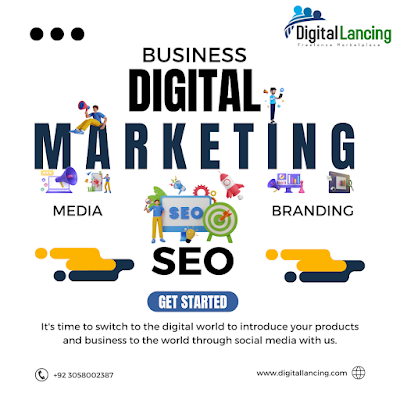Define Digital Marketing & its Uses with examples
Digital marketing refers to the practice of promoting products or services through various digital channels, such as search engines, social media, email, mobile devices, and websites. The objective of digital marketing is to reach a specific target audience, increase brand awareness, and drive profitable customer action. The main advantage of digital marketing is that it allows businesses to interact with potential customers in real-time and track the performance of their marketing efforts through analytics.
There are several channels that businesses can use for digital marketing:
Search Engine Optimization (SEO):
This involves optimizing a website's content to improve its ranking on search engine results pages (SERPs). The higher a website ranks on the SERPs, the more likely it is to receive organic traffic from search engines.
Search Engine Marketing (SEM):
This involves using paid search ads to target specific keywords and phrases on search engines. Businesses can bid on keywords and pay per click (PPC) for their ads to appear on the top of search engine results.
Social Media Marketing:
This involves using social media platforms, such as Facebook, Instagram, Twitter, and LinkedIn, to engage with customers and promote products or services. Social media marketing can include organic content, paid ads, influencer partnerships, and social media contests.
Email Marketing:
This involves sending promotional emails to customers or subscribers who have opted-in to receive communications from a business. Email marketing can be used to promote products or services, share company news, or provide exclusive offers to customers.
Content Marketing:
This involves creating and sharing valuable content, such as blog posts, videos, infographics, and ebooks, to attract and engage a target audience. Content marketing can help businesses establish thought leadership, build brand awareness, and drive website traffic.
Mobile Marketing:
This involves reaching customers through their mobile devices, such as smartphones and tablets. Mobile marketing can include mobile-friendly websites, mobile apps, SMS marketing, and mobile ads.
Video Marketing:
This involves creating and sharing video content to promote products or services, educate customers, or tell a brand story. Video marketing can be shared on social media, websites, and video-sharing platforms, such as YouTube and Vimeo.
 |
| Digital Marketing |
The benefits of digital marketing are numerous. Firstly, digital marketing is more cost-effective than traditional marketing methods such as print or TV ads. Secondly, digital marketing allows businesses to target specific audiences, resulting in higher conversion rates and a better return on investment (ROI). Thirdly, digital marketing enables businesses to track their marketing efforts in real-time, allowing them to adjust their strategies and tactics quickly. Finally, digital marketing provides businesses with an opportunity to build and strengthen their relationships with customers through personalized communications and engagement.
In conclusion, digital marketing is a crucial aspect of modern-day marketing. It allows businesses to reach their target audience, build brand awareness, and drive profitable customer action through various digital channels. With the rise of digital technology, businesses must invest in digital marketing to remain competitive in today's marketplace.


.png)

.png)


0 Comments